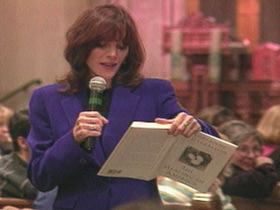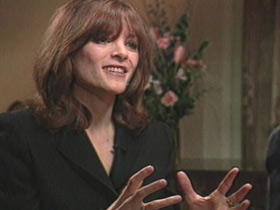Marianne Williamson, Part One
BOB ABERNETHY: On Perspectives this week, author and lecturer Marianne Williamson. In her popular lectures and in her latest book, THE HEALING OF AMERICA, the talk is of a spiritual reawakening taking place in America as the baby boomers emerge from a spiritual hibernation. As she sees it, many who were young in the 1960s are now ready to apply spirituality to politics.
MARIANNE WILLIAMSON (Author and Lecturer): Number two, you are obsessed with material things, and your spiritual life is begging for attention.
ABERNETHY: Thirty-four years ago this weekend, millions watched in shock as television showed the unthinkable, the assassination of President John F. Kennedy. Later in the ’60s, the next shock waves — the assassinations of Martin Luther King Jr., then Robert Kennedy — turned Marianne Williamson’s generation, she believes, away from political idealism. But now, she told me, she and others are ready to pick up where they left off three decades ago.

Ms. WILLIAMSON: I’m proud to say I was part of a movement in which we sang “All You Need Is Love” at political rallies. I’m proud that there was a time where we still saw politics as a possible container, a conduit for our higher philosophical views. In that sense I think, yes, it is picking up where we left off. but we’re not going back, though; it’s picking up where we left off. Like I said, many of us weren’t sober at the time, personally, and took drugs, you know what I’m saying? We were children, and now we’re not. You know, one of my books I wrote about how, if you were part of that scene in the ’60s, it’s like when you leave a nightclub and they stamp your hand, it means you can go back — you don’t have to go back, but you can go back. We — many of us were altered, there’s something that touched us that we will never forget. We shouldn’t have to apologize for that.
Many millions of Americans during the ’60s were so poised, that we had already repudiated — we had already said what we didn’t want, and just when we were about to say the kind of world we did want, those people who held up the torch for us and said what it looked like, from Bobby Kennedy, Martin Luther King, or the Kennedys, these men were literally assassinated in front of our eyes. And I think that an entire generation of us have been much like the son of Bobby Kennedy who watched his father assassinated on television and never got over it.
And I think for over the last 30 years, an entire generation has been frozen. The bullets that struck the Kennedys and Dr. King physically struck millions of us, and I think that we recognize now, there’s a deep understanding that people’s lives are not run by our conscious beliefs, they’re run by our unconscious beliefs.

And I think millions of us formed an unconscious belief after the assassinations of the Kennedys and King, the deaths at Kent State — I think we received a message. And that message said, basically, you can go into the private sector, you can be creative there, you can pretty much do whatever you want to do, you can make a lot of money, but don’t try to change things on a fundamental level. They might kill you.
And I think millions of us, in ways we might not even have been conscious of, have bowed before that, taken our prodigious, amazing upside of the American temperament, poured it way, way, way, probably too much into the private sector, leaving the public sector, abdicating the field. But, something now has happened, and that is that generation has reached middle age. You reach middle age, you start thinking about your death. You start asking yourself — what will the day of my death be like? What questions will I ask myself? How will I answer?
And what I sense happening now, there are millions of people in that group of — those of us who know we held a vision in the ’60s, and now, we’ve just become as much servants to the downside, in many cases, of capitalism as to the upside, who now are thinking and now feel that the thought that we might die knowing that we didn’t really go for it is actually scarier than the thought that they might kill us if we do. And I know there are many people who feel that as I do, and that is an awesome change if we can harness that energy.
ABERNETHY: Next week we’ll have more with Marianne Williamson. And in a few weeks, the perspective of Rabbi Harold Kushner, that had been scheduled for this week. Rabbi Kushner discusses: How good do you have to be?

